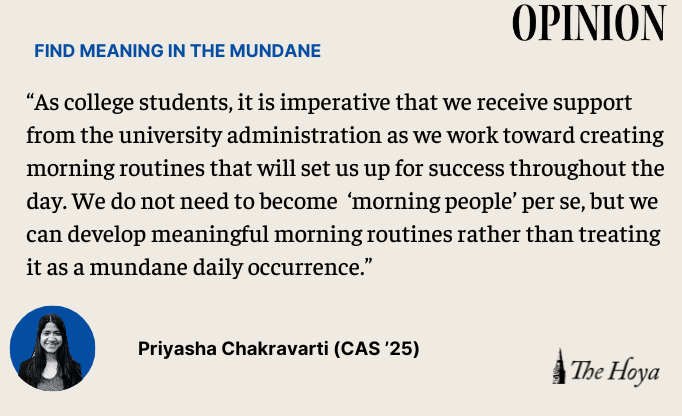“I am not a morning person.”
This phrase is commonly heard from students in university, especially from those taking early morning classes.
Some students wake up around 8 a.m., grab a banana, head out on a morning run, take a shower and settle down to work.
Others wake up later, maybe around 10 a.m., slam the snooze button on their alarm clock and roll around in bed until they are startled by the panicked realization that it is almost noon.
Despite the variety of morning schedules, we all lead busy and dynamic college lives, and a digital landscape of fabricated morning routine videos surrounds us, encouraging unrealistic standards.
Instead of pursuing those unrealistic social media standards, we as students can work to create a balanced morning routine that works for us. But it does not end there — the Georgetown University administration must also play a critical role in supporting their students by minimizing early morning classes during the academic year.
After watching the overly saturated videos produced by popular YouTubers in the late 2010s, I started to idealize and romanticize the hour or so after I woke up. The videos featured glamorous morning routines — 6 a.m. wake up times, morning runs, kale smoothies, perfectly made beds, fancy stationery and color coordinated outfits. I tried to create a picture-perfect and aesthetic routine for myself, but it barely lasted for the first week of classes.
Such ideal morning routines often seem unattainable for Georgetown students juggling a full course load, internships, jobs, extracurriculars and busy social lives. But there is no need to chase the unattainable.
Morning routines are situational — there is no one-size-fits-all approach.
It helps to prioritize a few steps one wants to take every morning so that they feel motivated and refreshed. This can include eating breakfast, taking a shower, meditating or even just drinking a glass of water before a cup of coffee. While it does not have to be elaborate, research indicates that a consistent morning routine ensures more productivity, increased focus and less stress.
There are also certain damaging habits we can avoid in the morning.
For example, it is very tempting to reach for one’s phone as soon as they wake up in the morning. In fact, according to a study conducted by IDC Research, 80% of respondents use their phones within the first 15 minutes of waking up. While checking notifications and scrolling on social media may release dopamine — a “feel-good chemical” — it can cause us to feel overstimulated and distracted throughout the day. The external stimuli of the digital world prevents us from waking up calmly.
Instead of trying to restrict morning phone use altogether, it can be helpful to use a phone in ways that are more positive.
For instance, my family in India is 10 and a half hours ahead of my timezone in D.C., and I have learned to use my phone in the mornings to quickly catch up with them. It makes me feel more connected with them and helps me to start the day on a positive note.
Other positive starts to the day include creating a quick to-do list or writing down gratitude statements.
In addition to personal responsibility, the university administration also has an obligation to make mornings more manageable for students so that they can maximize their full potential.
In college, our morning routines often depend on our schedules and workloads. If our first class is at 8 or 9 a.m., we may struggle to build an effective and relaxed morning routine.
A research study from the University of Nevada, Reno and The Open University in the United Kingdom found that undergraduate students learn best in classes that start after 11 a.m. It noted that it is especially important to offer afternoon and evening class options for first-year students and sophomores, who may still be adjusting to the added pressures of the college environment.
At Georgetown, academic departments are required to schedule at least 5% of their classes to start between 8 and 9:30 a.m.
Instead of setting a departmental minimum, the university should consider setting a maximum number of courses that can be offered at this time — especially if they value their students’ best interests, mental health and productivity. Keeping a maximum number of courses offered at this time will still ensure that students who prefer early morning classes are accommodated.
As college students, it is imperative that we receive support from the university administration as we work toward creating morning routines that will set us up for success throughout the day. We do not need to become “morning people” per se, but we can develop meaningful morning routines rather than treating it as a mundane daily occurrence.
Priyasha Chakravarti is a junior in the College of Arts & Sciences. This is the second installment of her column, Find Meaning in the Mundane.














